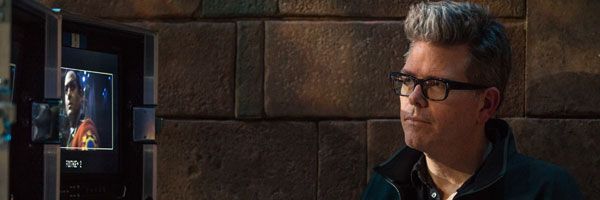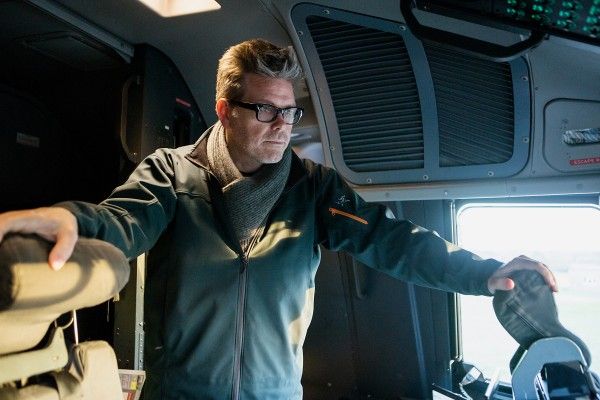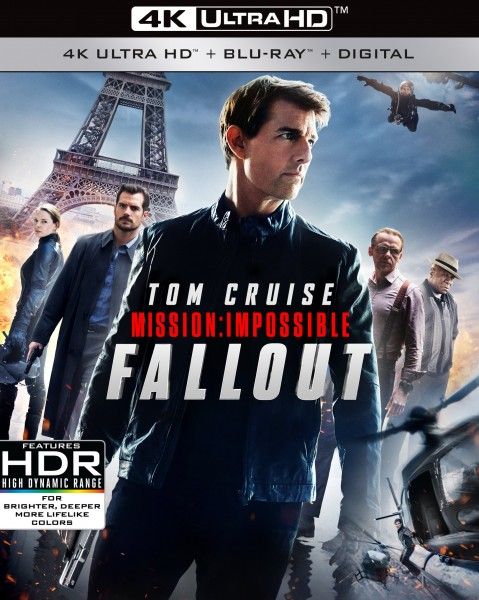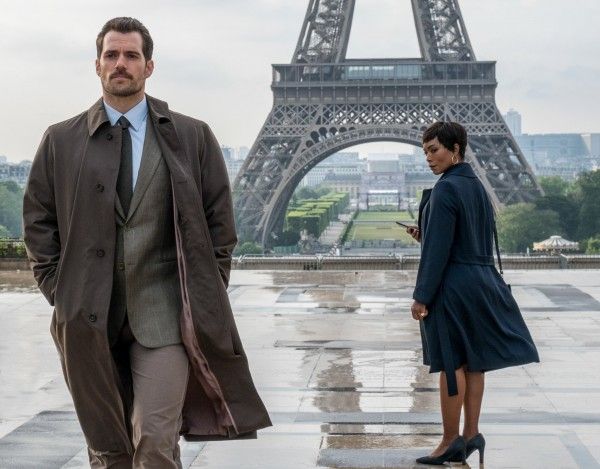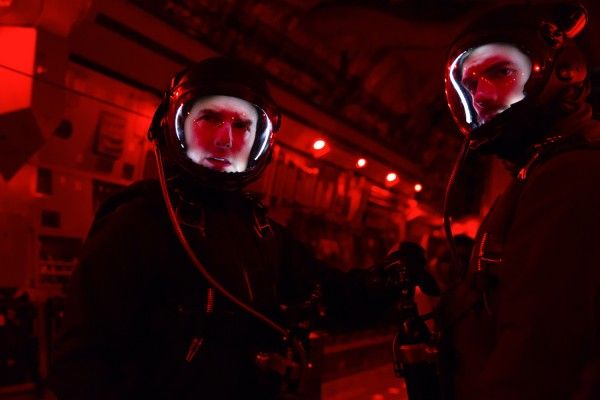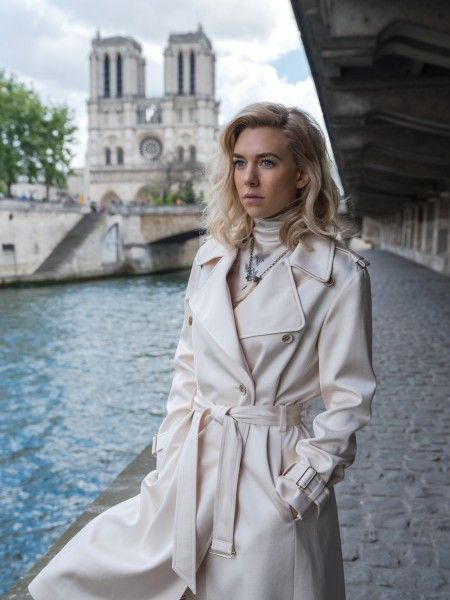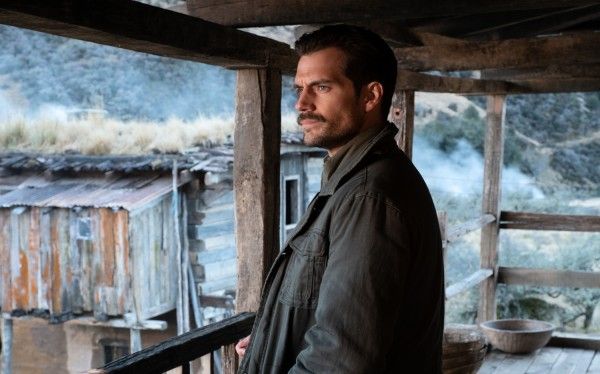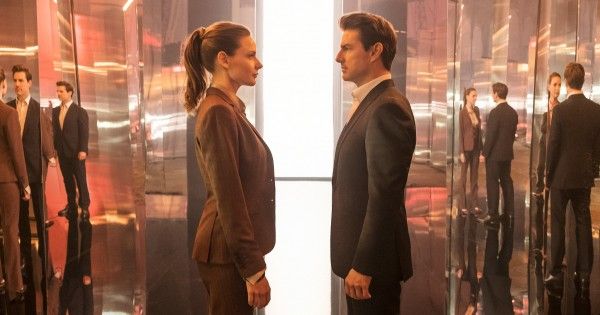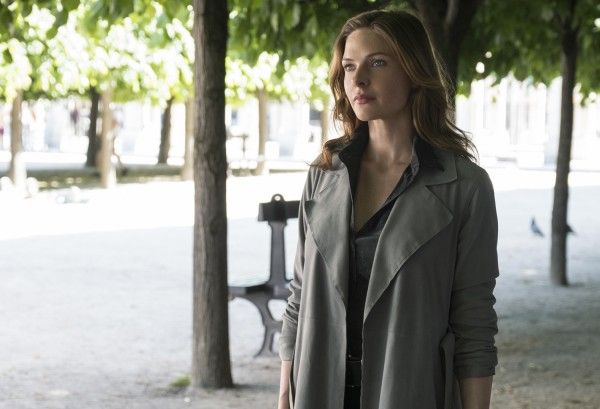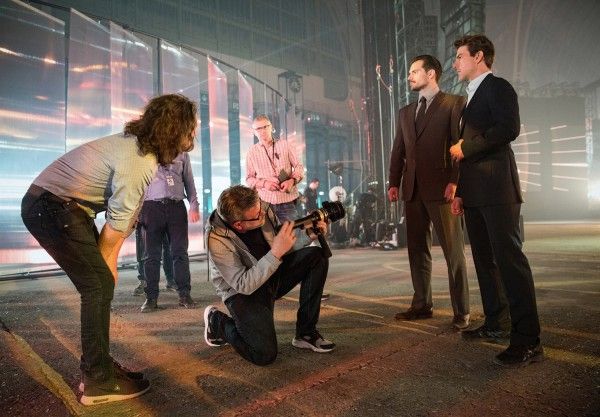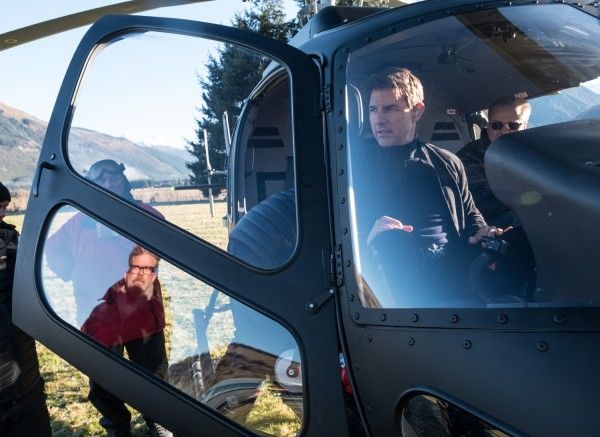Over the past few years, Collider has a long-running screening series with IMAX and back in September, we screened Mission: Impossible – Fallout for some of our lucky readers. After the screening ended, I sat down with McQuarrie for an almost 90-minute conversation where we went in-depth on a myriad of subjects (here’s part 1 and part 2). As the two of us were leaving the building, I mentioned I still had a lot of things that I didn’t get to ask, and he said he’d be up for doing another screening and Q&A. I figured it would never happen due to his busy schedule, but a little over a week ago we screened the film again and then did another extended Q&A. Since the interview ended up being over 15,000 words, I decided to break it up. The other day I posted part 1, and below is part 2.
In today’s installment, McQuarrie talks about his writing process, procrastination, his favorite shot in the film, how the dream sequence came about, creating action scenes without score, choosing the film's locations, which actors and actresses he'd like to work with, and a tiny tease about Mission: Impossible 7.
While 2018 has seen some incredible movies, I’d argue one of the top films is writer-director Christopher McQuarrie’s Mission: Impossible – Fallout. Not only does the film feature some of the most incredible action set pieces I’ve ever seen, the movie shows off unbelievable work from every department, an incredible score by Lorne Balfe, and a script that keeps you on the edge of your seat until the final frame. It’s one of those rare films where everything just works.
Check out what Christopher McQuarrie had to say below. Mission: Impossible – Fallout is on Digital HD and Digital 4K HDR now, Blu-ray/4K HDR/DVD December 4th).
Collider: I want to talk a little bit about your writing process, and specifically on a Mission: Impossible film. You find out that you're going to do Fallout. Let's just use that as an example. Talk about day one. What's going on prior to you sitting down the first time, to actually write the script or dialogue or scene or whatever you're going to do?
CHRISTOPHER MCQUARRIE: I clean my office. Many, many times. I walk my dogs. I watch a movie with no sound on. I have a drop down screen on the other side of my desk, so I just drop the screen down and put on, I don't know, Once Upon a Time in America or something long. I just put it on and turn the sound off and don't even really watch it. It's just there. I've discovered that the worst thing you can do for writing is actually try to write. You have to do it sometimes, there's what I describe as the moment of ignition, which is harder and harder to achieve as I get older and older. That's probably symbolic of something. You're pushing and pushing and pushing and then at a certain moment something clicks and the writing takes over and you're no longer driving it. It's pulling you along. The perpetual motion of whatever you're doing. You're inspired to do something. The discipline of sitting down and doing that thing is absolutely dreadful. I need enormous stress, pressure, tension, debt, deadlines, anything to make me sit down and do that.
That first day that you're writing, how much have you-
MCQUARRIE: Not writing. The first day of not writing.
The first day of not writing, how much is that day where you have ideas, you've spoken to Tom, you've spoken to the studio, you have an inkling of where it's all going to be going, or is it one of these things where you're doing all this without it? How much have you spoken to people about the idea and how much is it your figuring it out before you take it to everybody else?
MCQUARRIE: Well, Tom and I talk about everything. I bounce a lot of ideas off of him. On Rogue, for example, we would speak once a week. We would talk for about two hours and then I'd go off and work on the stuff we talked about. We're really excited about one big idea and this was the idea that was going to make the movie work. A week later I would come back to him and say, "Remember that idea we talked about last week? Doesn't really work. I spent a week working on it and it sucks but I have this other idea." Every week we would do that and I would say probably 10% of what we talked about in a given conversation actually stuck. At a certain point, we were just in really a lot of trouble, time-wise. Suddenly, boy, the ideas start coming, when you've got days as opposed to weeks. That's just how it works.
When you're writing, how much are you thinking about budget as you're writing and how much is it I'm just going to put all my ideas on the page and then we can always pull back based on money?
MCQUARRIE: I do not think about money because the producers do that. They'll come to you and say, "Hey, this sentence that you wrote, it cost 12 million. You have $700. Solve that problem." They'll always come to you with that. I don't worry about budget, I worry about editing. I think all the time about how is this going to cut together, how are characters introduced, and efficiency. Just how do I tell this story in as quickly and elegantly a way? I'm writing out what is the edited film, at least one version of the edited film. It's not the rule. But as you read it, you're reading a description of this is what I want you to see and then I want you to see this. Then you cut to this person and then the scene ends.
I was talking to a lot of writers who say that when they wake up, the first few hours of the day is their golden period where they can actually write. They're pretty creative and then as the day progresses, less so. Other people I've spoken to say that they can do nine to five and it's just that's their routine. How is it with you?
MCQUARRIE: It's procrastination. I wake up and I know maximum there's six hours for you to solve this problem. It's not that big a deal. It's not that heavy a lifting job. Just sit down and do this six hours now and then take the week off. No. I stress for the whole week. Low grade stress. I'm goofing off and in the back of my mind thinking, I've really got to do that. I've really got to do that. Then, with five hours until people need the pages, I start writing the six hours of work that I needed to do and then probably in the middle of that I waste an hour on the phone and it becomes this thing of just when am I going to learn?
You ever check your blood pressure when you're writing?
MCQUARRIE: I do not have high blood pressure. I have extraordinarily high cholesterol, not high blood pressure.
Questions from the audience begin here:
The whole chase sequence that starts from wham, truck in the water, to that whole sequence that ends up cars to motorcycles and running with the knife going in. Hearing your process, how much of that had you figured out or how much of that was being figured out on the fly?
MCQUARRIE: Anything that was action in the movie, with the exception of that gun fight, was worked out in advance, and worked out because we knew what the locations were. When I went and scouted Paris, I had written a rough sketch of what the chase sequence is going to be. We knew, for example, we were breaking Solomon Lane out. We came up with that idea in the last days of Rogue Nation. We were already talking about that as an idea.
When I toured Paris, they took me on a boat ride around the Seine and we went into that tunnel where they escape through, and of course I saw these holes and I went, "Well, I know where the scene's going to end. I knew where the motorcycle portion was going to end." I knew we wanted to do a motorcycle and I knew we wanted to do a car, and practical decisions are telling you what order those things happen in. I knew I had all the guys in the car at one point. Had to figure out how to get all the guys out of the car so that it was just Tom and Solomon Lane. I had the idea of the cop.
When I wrote it, it was a man, Tom said change it to a woman. He said it would be a lot more powerful scene if you make it a woman. I said, "Really? You want to leave a woman shot in the street?" He was like, "Go for it." By the way, that kind of thinking permeates everything, and will, pardon my language, it will fuck you every time you start thinking about ... Your film doesn't represent anything but your film and what film has become is this thing imbued with all of this responsibility. If I say this, I'm making this statement about a whole group of people or a whole group of individuals. No, they're people, stuff happens. You can't be responsible and make art. You just can't. I don't call this art, by the way. I'm not an artist.
But anyway, I went off on a tangent. All that stuff we had worked out. But then there were things like we were in a traffic roundabout where Tom was supposed to get trapped by all these cops. I said, "There's got to be a better roundabout somewhere in Paris. Can you guys get me the Arc de Triomphe?" The scouts, the French location guys were just like, "Oh my God." They came back to me and they said, "It's closed one day while you're here. They will give you the Arc de Triomphe for two hours starting at six in the morning." Well, the sun didn't come up until 6:30 so we had to figure out how to execute the entire sequence in the 90 minutes of light that we had available, and everything that you're looking at there we shot in 51 minutes. Everybody was saying, "Don't do it. It's impossible. It takes two hours to turn the lights on on a Mission: Impossible movie." I said, "We can do this." There were four days like that in Paris, which we called the impossible days. There are four impossible days. By preparing the crew and by telling them this day is impossible, they all wanted to do it and they all wanted to make it happen.
Everything that you see around the Arc de Triomphe and everything where he's going down the route of opera, towards the opera house, was all shot on the same day. That's when the company moved 40 vehicles through traffic in Paris. Really, really, really difficult stuff. They'll give it to us for four hours? We'll take it. We never stopped thinking that way. I think you feel that. It permeates the action in the sequence itself. That sort of thing. The gunfight was pretty much on the day. There were definitely things in the helicopter chase where we were on the day ... But individual shots. But for the most part, all of the action we had a plan only because the location was telling us what that plan was. If I'm just sitting down at a blank page and somebody says, "Write action," the experience paralyzes me from doing it. Because I know if I'm writing to a non-existent location, then I'm going to go scouting and I'm going to be trying to find a location to fit this action in, I'm either going to compromise on the location or compromise on the action. It's a luxury on a movie like this that I'm able to do that.
Was there a city you almost got to instead of Paris or London?
MCQUARRIE: We almost went to Italy. We almost went to Naples. I went and scouted Naples. Really cool, actually. I would scout it again. But Naples was a backup if Paris said no. I was determined. The decision to go to Paris happened just after the attacks in November of 2015. I was watching them happen on T.V. and I called Tom and I said, "We're going. We're going to go to Paris." He said, "Absolutely." Of course everybody tried to discourage us from doing that. They said it's not safe. Tom said, "Exactly, and that's why we're going. We're going to show people that it is safe." Because we both love Paris. We each have our own relationship with the city. We were very blessed that Paris embraced in and let us come shoot there.
You also like red wine.
MCQUARRIE: It helps.
These films have such big spectacles, like Tom climbing the tallest building, to hang out of an aircraft. What's it like having to try and up the action in every film with someone like him?
MCQUARRIE: Don't. Don't try to top it. My attitude going into Rogue was just make a movie that's worthy. Make a movie that's in the top five Mission: Impossibles. This time I was like, "This time I'll just be in the top six. As long as I'm not some number seven,” that’s all we were really trying to do is speak to that. It was interesting sitting here watching it tonight. As I was watching not the action but what makes you give a shit about the action, that I was able to look at it and go, it's infinite. The possibilities are infinite. They're certainly not building a taller building right now. You can't do that. Even if they did, they would be like, oh, it's not as good as ... I've directed two of these movies and I'm not ashamed to say the Burj Khalifa sequence is for me the best sequence. It’s the best 20 minutes in a Mission: Impossible movie. It's amazing. So much of what makes it good is the storytelling in it. When you go back and watch the Burj sequence, the climbing up and down the building is really just like this tiny fraction of what is Dubai, which is this incredible, nonstop the minute they get there. You're just like, oh my God, oh my God, oh my God, oh my God. That's what makes the movie work. We got away with murder here. He's climbed mountains in movies before and he's done other stuff. He's not hanging off the side of an airplane or this, that, or the other thing. It's the stakes of the third act that are what make it work.
You shot in 35mm right? And then you switch to digital? What cameras do you use for the helicopters?
MCQUARRIE: For the helicopter we used Panavision. I think they're called Panavision DXLs. They're 8K digital cameras. Did I sin? Yeah, we used digital cameras for two sequences in the movie. The simple reason was weight. Weight and reloading. To put film cameras on the helicopter, by the time it was airborne, the film would have run out. We shot 70 hours of material with those helicopters and it was because you could just leave the thing rolling infinitely. It also helped obviously for the IMAX ratio and the IMAX resolution. The other sequence was the HALO sequence the only camera that we used was mounted on the guy's head and if we put an IMAX camera on his head, 400 miles an hour straight down, no parachute would have saved him.
I'm assuming a lot of you guys will get the Blu-ray or see it on digital. If you do not know how they filmed that sequence, the HALO jump, it is jaw-dropping and crazy and watch that extra.
MCQUARRIE: Watching them shoot it is as crazy as watching them do it. The camera operator especially, his name is Craig O'Brien, he was really an incredible guy. There's another guy who deserves an Academy Award. Craig O'Brien.
You and Tom did a presentation at CinemaCon, which is like ComicCon for theater owners where they show off the future of movies and they broke down the HALO jump in front of all the theater owners. I was in that auditorium and I'm telling you it doesn't make sense how they pulled it off. I don’t know how you did it.
MCQUARRIE: Neither do I.
First of all, Tom Cruise running in a movie is my favorite thing of all time. He's the best one hands down. To my question, my favorite thing in your movies is the chase scenes and fight scenes without music. Those are, I think, the best scenes in Jack Reacher, Rogue Nation, and this. I just love them. What gives you the idea to do those and why do you do them?
MCQUARRIE: Anything you can get away without music, do it. There are moments in this movie where I watch it now and I'm conscious of ... just a few. Just a couple places where you hear the music come in, and I go, "Chicken. Chicken." But things like the bathroom fight, it never occurred to me to put music in there because what you have in the bathroom fight, you have that ambient music outside, which has got this ... There's a heartbeat going on in that scene. It would feel to me like the music was trying to create tension. Now, what I do, how I have the confidence to do that is I cut the entire film without music. I don't use temp music at all. I have seen the finished film many, many times before music ever enters into it. I can feel where things need help, where emotions need extra tweaking. As a result, when you hear the scores in my film, they're very much their own. You can take the score out, put it in your car, and listen to it and feel the story happening.
The other thing that happens is that the movie develops its own rhythm. A temp score gives you a false read. You're watching the scene and you're thinking it's working but in reality the music is making you believe it works when it doesn’t. Music is a very, very effective, very powerful tool. By cutting without music I discover that a single piece of music can be played multiple times in a movie and hit all the right cuts. Jack Reacher, as a matter of fact ... How many people have seen Jack Reacher? Why haven't all of you? If you go back and watch Jack Reacher, the music that introduces Jai Courtney and the music that introduces Werner Herzog and the music where David Oyelowo does a thing that is a spoiler, all three of those pieces of music play over their device, almost without any alteration. Basically, where you see the character doing his most evil deed plays over the character meeting his end. They just dropped in. It was music that Joe Kramer had written for those chunks and you lifted them out, put them on the other place, and it played perfectly. That's because the movie had its own internal rhythm to which the composer is writing as opposed to what happens when you write with temp score, which is I'm cutting to the rhythm of some temp music, and then composer is forced to conform to that. They don't have the same freedom.
The benefit of that is there are certain scenes you can't tune and you put music on it, you've been living with it for so long you go, "Why do I really need this? I don't really know. I like the scene without it." You just take it out. Then as far as car chases are concerned, if you have a car chase with more than one car in it, and why wouldn't you? You have all the score you need. You have the differentiation between the two engines and you have the shifting of gears. If you listen to the car you can hear it falling apart over the course of this scene. There's belts coming in and rattles and all that other stuff. You lose all of that if you bury it in your score.
I really loved Vanessa Kirby in the film and I was wondering, was Vanessa Redgrave ever considered for Fallout or was she unavailable?
MCQUARRIE: Was she ever considered for Fallout? No, only because of ... There were other considerations. Actually, we talked about her in Rogue as well. But the notion of ... How many people picked up on it? Your instinct is very good because that's who she is. That was always an inside joke with us that we never intended on including her in the movie. Then when I was writing her voiceover for that scene for completely different reasons, I went, "Ah, fuck it. I'm going to throw in there." It's fun to watch people who pick up on it. I love Vanessa Redgrave. I'd give anything for her.
Has there ever been an idea that you and Tom looked at each other like, "No, we can't do that."?
MCQUARRIE: Can't do it? No. The only time we can't do anything is if we can't see his face. The only time he won't do anything is if it's boring. Tom doesn't say no, he says, "Boo. Boo." That's how he rejects it. If you get to the boo ... Now, I didn't get to any boos on this one, so I know I was firing on all cylinders.
You talked about criteria of what makes a good movie. For me, it's simple. It's like, I want to see it again, and this is a movie I wanted to see so many times.
MCQUARRIE: Thank you.
When did you write the dream sequence? Did you write that after the fact? There are a couple different dreams.
MCQUARRIE: The dream sequence was ... It was actually the very first thing we talked about. I asked Tom, "What do you want to do with this movie?" He asked me what I wanted to do, and I said, "I want to make an emotional movie. What do you want to do?" He said, "I want to tie up the story with Julia, people were still asking me about her.” We thought we had resolved it in Ghost Protocol and that wasn't enough of a resolution. I said, "Okay, we've got to reintroduce her character. We've got to bring her back and we've got to tell the whole story." I knew right away there were four scenes. You need the scene where you reintroduce her, which was going to be this dream, because I wanted to put the audience inside Ethan's head. Really put them with Ethan emotionally. I knew there was a scene where Luther had to tell Ilsa the story. It was a scene straight out of the The Verdict. What else can I tell you about Frankie? He's got a ton of backstory. I knew there was a scene where they ran into each other, and I knew there was a goodbye. Those became almost like the four masts on the deck of the ship that held the whole thing together. That was the first thing we ever came up with.
We talked about different versions of scenes where he went to see her, or she was dying and he went to say goodbye. Nevermind that those scenes sucked. They would just be cut from the movie. You develop an instinct for this is not going to be in the film. There are a couple of scenes in this movie that I shot before we had finished the screenplay and I knew ... They were making a point that I could make better elsewhere, and I just felt as I was shooting, I love this scene, it's really cool, it'll never be in the movie.
In both the films you directed, you brought in great acting talent. Henry Cavill, Angela Bassett, Alec Baldwin. Do you have anybody on a short list for maybe M:I 7 if you direct it? That you would want to bring in specifically?
MCQUARRIE: Oh my God, there's not a short list. A very, very, very long list. There's a lot of really extraordinary actors that I would love to work with. It's always that thing of availability and the room within the story. That's really the thing. But yeah, I've got a lot of people I’d like to work with. All I really want to do is work with Cate Blanchett. That's just a given.
Make it happen.
MCQUARRIE: With respect to all other actors.
I'm not an expert on Mission: Impossible, but the music felt very old school. You take a very underused cue, my favorite cue, blew it up into the main theme and I was wondering what kind of conversation you had with Lorne taking that.
MCQUARRIE: In terms of that old school feel of it?
Yeah, that old school feel of that.
MCQUARRIE: It's just a way I see movies in my head. I've struggled with each movie to get more to a place of making it look like a movie to me. I'm not trying to make movies look old, I'm trying to make them look like what I think movies look like. I grew up watching ... Most of the movies I watched on T.V., broadcast out of New York, with a shitty signal on a tape that would probably be played over five more times. They're grainy and beat up. When I see stuff that's too clean, it just doesn't look like a movie to me. I have a very weird spectrum that I'm ... I'm in a room full of people going, "It doesn't look like a movie." They're like, "What are you talking about? It's moving. It's a movie." This looks more like a movie to me for more of the movie than any movie I've worked on previously.
I'm an amateur storyboard artist and I wanted to know if you seen them at all, how much of the movie was true to the original boards drawn by the artist?
MCQUARRIE: You will see it on the Blu-ray. We've included a bunch of it. Helicopter chase, car chase, basically the big action scenes. Not fights so much. They're very hard to storyboard and they're very fluid. But basically, anything involving a vehicle, it's storyboarded. Very close to what you see. Except we storyboard too much, cut a lot of it out.
How much do you feel that you imbue yourself in the movie? Because I've seen Jack Reacher, I've seen now M:I 6. How did you imbue yourself because the way you're describing how your stress level and tension all this, how much do you feel? Does Tom feel that as well? Because it feels like everything you're describing, it makes sense in certain scenes where you feel a tension rising, and you're describing, "I was getting this, I was feeling this." The stress level and how much do you feel the other actors felt that stress just filming?
MCQUARRIE: Tom and I are the beast with two heads. Other people are watching us interacting going, "No one knows what the fuck you're talking about." But he and I are finishing each other's sentences because we're both after the same emotional beats. Making a mission and watching a mission are very similar experiences. Tom and I have embraced that and incorporated that into it. We laugh when we watch the movie when it's over because we take certain people ... certain characters in the movie are ... That's the studio and that's the producer, pointing to those people. We constantly look at our crew as the team. Alec Baldwin's the studio, and Angela Bassett's the studio. That kind of idea. We have our little analogies within that that we laugh at. It's not conscious when we're doing it but it permeates everything we do.
I want to talk about Lane and Benji Lane when they do the swap. If Walker was watching them the whole time, how does that switch take place? Because it happened off screen, but how does it actually happen there?
MCQUARRIE: It's a damn good question. We shot all of it. It was so boring, we cut it out of the movie. I can tell you that there was a whole thing and you'll see little shots of it on the Blu-ray. There was a whole thing we did, we worked out all that ... I obsessed about it. Nobody gave a shit. Cut it out.
Congratulations on the best one non-sexual fuck in a movie in ages.
MCQUARRIE: Thank you. Great expression, by the way. Non-sexual fuck.
Who's your first script reader when you are done walking the dogs and cleaning your office?
MCQUARRIE: A writer friend of mine named Erik Jendresen, who wrote Band of Brothers. Extraordinary writer, and Sacha Gervasi, who directed Hitchcock, and he just did My Dinner with Herve. There's two guys that I know very well that I trust and who are just no bullshit. They'll just cut right through it.
If you could narrow it down, what would be your favorite shot of the entire movie?
MCQUARRIE: I can narrow it down, and I hate using the word favorite, but I can tell you it's the shot where Ilsa's walking through the pillars. When she's following Ethan. That's actually my favorite scene, that's my favorite sequence. Everything through the dream. Et cetera et cetera. But that one shot, and that was the shot that I was convinced would never make it into the movie. I was just waiting for somebody to say, "This walking is too long." Nobody ever did and I got to keep it in there. I love that shot.
Have you ever considered doing The Raid remake? Because the way you do action sequences, I can see you doing a great job.
Steve: Joe Carnahan and Frank Grillo are remaking it.
MCQUARRIE: I have another remake I want to do, but it's not action.
Since you shot on 35mm, have you seen a print of the film?
MCQUARRIE: I have a print of the film. I have not seen it. I have seen about eight minutes of the movie on film, and it was ... I was like, "Oh my God, it's a movie." I was like, "That's why nothing looks like a movie." Because I don't see movies on film anymore. When I saw it transferred to a print it looked like grainy, it was gritty, and even the stuff on the C17 that was all shot on digital looked like a movie. I can't wait to watch the print.
You're one of Hollywood's most famous script doctors. What lessons have you learned jumping on other people's stories and just getting in there and collaborating on another person's essentially seed of a creation?
MCQUARRIE: Everything you think is precious is bullshit. Coming onto somebody else's movie and having no emotional connection to it whatsoever, you're looking at it from orbit and you're just able to say, "Dude, you don't need that. You're going to cut it out of the movie." Then, of course, I do not apply that when I'm making my own movies. You can't help it. But it gives you some comfort when I never solve that problem, and whatever that thing was that I was obsessing about, I didn't solve it. I didn't figure it out. Then I get into the cutting room and go, oh, thank God I didn't need that. Okay, good.
The thing I love most about the film is it takes a ton of people to save Ethan. Ilsa saves Ethan, Walker saves Ethan, but it takes Ethan to save the world. I wonder if that was on purpose or if that's just how it came together.
MCQUARRIE: About everybody saving ... Yeah, it's always about the team. It's a testament to Tom. You have the star and the producer of the movie who is constantly looking at ways to build every character around him and give them their thing. He's not afraid to have the woman save his life. He's not afraid to get his ass kicked in the men's room. There's a vulnerability to Ethan that makes his accomplishments that much more powerful.
Okay, so, it's great to hear how your stress and procrastination helps fuel your creativity. Practically speaking, how do you also keep stress from pushing you into a coma?
MCQUARRIE: I just procrastinate. I just don't get around to the coma. No, it eventually brings me to a spot where I've got to do it. I've got to get it done. I get it done, it just doesn't make it enjoyable. I'm not one of those people who does their homework right when they have to do it.
Isn’t it your subconscious, though? It's still going while you're not going.
MCQUARRIE: It's still going and then there's ... I'll tell you what it does prepare you for is then when you're on set and an insurmountable problem happens, I'm like, yeah, I can do that in an hour. I've done it in an hour. I can do it. Don't worry about it. When we're on set, and it's super tense, and it's really, really ... I'm incredibly focused and collected. Sometimes I freak out.
What did you think of the 3D?
MCQUARRIE: Of the 3D? Of the 3D that we saw, I was actually really impressed with it. I'm not a big 3D guy, and thank you all by the way for indulging me in watching the movie in 3D. There were a couple times where I was looking at it ... I know the work that went into it. The most important part about the 3D is that I did not feel aware that I was wearing those glasses the whole time. I was not really bothered by that. A big part of that is the projection, the brightness of the projection is really good. I thought it was cool. I don't know, what did you guys think of the 3D?
How hard is it to decide how the tape is going to self-destruct?
MCQUARRIE: You mean how it’s delivered, or the work that goes into actually self-destructing it?
To designing how is the exact way it's going to destroy itself.
MCQUARRIE: Well, Tom and I, in the two movies that we've done, they're both analog. It comes to them as a record and it came to ... I really love that tape player. I was determined to get that ... That tape recorder was originally going to open Rogue in almost like a scene from the past. I brought it into this one. I actually have it. That's the one prop that I saved from the movie. The work that goes into it, you would not believe. There's actually a digitally removed tank under the table that Tom is sitting at, with a big hose, and you have to build one book special. There's a hole in the table, there's all this stuff that goes into it. The stuff smells. It's crazy. It's crazy.
This one definitely had a more darker tone to it. You said you didn't want it to be like Rogue Nation. For the next one, which direction would you hope to see it go in? Would you want it not be anything like Fallout, would you want it to be more like a happy ending, everything's great, or keep the same fundamentals?
MCQUARRIE: I have made a suggestion. Whether or not it's me. It's fucking awesome.

